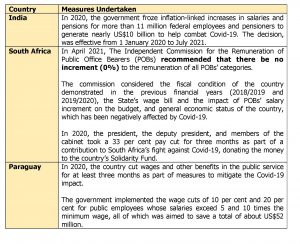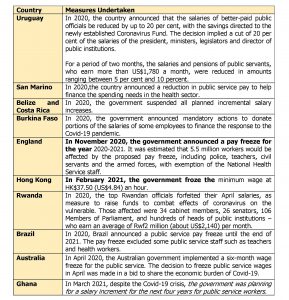- +254 (20) 2710051/71/73/75/81 or (0)736 712 864
- info@src.go.ke
- Rewarding Productivity
Review of salaries during Covid-19: Global experiences
June 29, 2022 | 6:43 pm
Governments around the globe are facing significant financing requirements for rolling-out emergency policy actions across different sectors (including the health sector for the containment, mitigation, and treatment of the pandemic), and to support households and firms. At the same time, governments are facing rapidly declining tax revenues.
Due to Covid-19 restrictions across countries, the International Labour Organization (ILO) estimates that 8.8 per cent of global working hours were lost in 2020 relative to 2019. This is equivalent to 255 million Full-Time Equivalent (FTE) jobs, which were about four times greater than during the 2009 global financial crisis.
Global labour income in 2020 is estimated to have declined by 8.3 per cent, translating to 4.4 per cent of the global Gross Domestic Product (GDP).
In some countries, pre-existing high levels of public debt and binding borrowing constraints limit their responses, leading policymakers to look for emergency financing, including reducing the compensation of government employees.
Several countries considered to introduce pay cuts as part of the reshuffling of their expenditures during the COvid-19 pandemic, as shown in the table below.


Workers globally have had to accept shorter working hours and wage cuts in different industries. Wage cuts have also been negotiated within collective bargaining agreements.
Several countries, including South Africa, Rwanda, Burkina Faso, India, Argentina, Australia, Brazil, the United Kingdom, the United State of America, and Canada, took measures to rearrange their expenditures during the Covid-19 pandemic in a bid to share the economic burden.
The measures undertaken in the above countries include, but not limited to: introducing basic salary cuts; withholding annual increment and freezing of minimum wage; freezing inflation-linked increases in basic salary and pension; suspending all planned salary increases effective financial year 2020/2021; and mandatory donations of portions of the salaries of some employees to finance the pandemic response.
In Kenya, in the spirit of social dialogue, Kenya’s social partners entered into a Memorandum of Understanding detailing a joint approach to managing labour relations during the pandemic period.
Select Latest News and Events to view
The Third National Wage Bill Conference (NWBC)
Question-and-answer session on revenue and wage bill management – Day 2
Third National Wage Bill Conference Day 2
The 3rd National Wage Bill Conference
CAPACITY BUILDING ON PRODUCTIVITY MEASUREMENT
GETTING TECH SAVVY: SRC ROLLS OUT AUTOMATED WAGE BILL MONITORING INFORMATION SYSTEM
Executive and CCIOs adopt joint resolution on closer collaboration
Extending partnerships into the civil society world
Going Live on Kitwek FM
Outlining SRC’s mandate on Mulembe FM
Stagnation in the public service
All in a day’s work: Part-time versus full-time
Insight into the remuneration of health workers in the public service
Launch of Framework for Recognising Productivity and Performance in the Public Service
Hon. Justin Bedan Njoka Muturi, EGH
Skip to content
